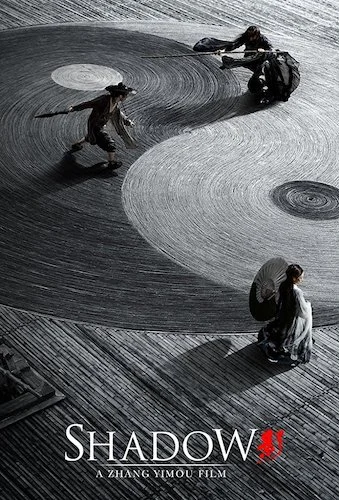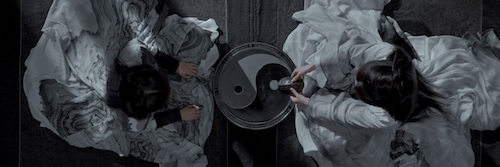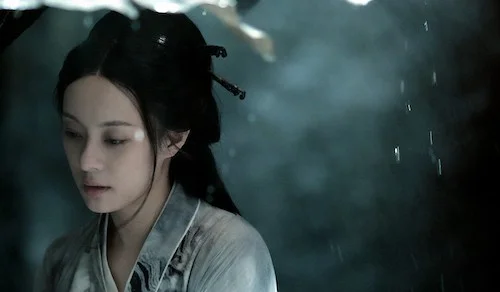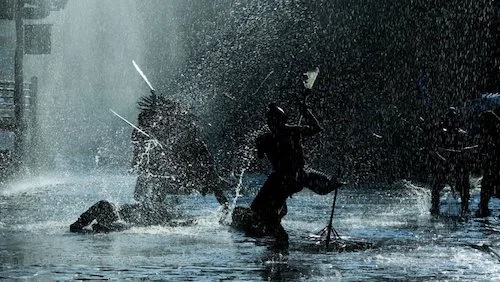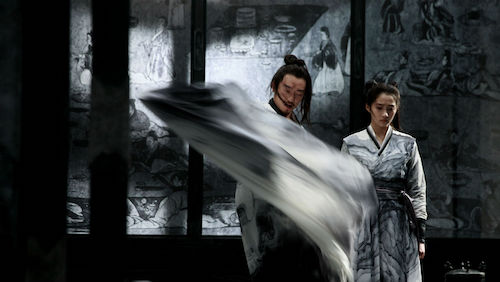Shadow
It's good that we are still getting works from Chinese filmmaking legend Zhang Yimou, especially because you can sense the effort put into them no matter what the result is. Sure, The Great Wall was a critical and box office disaster, but we can move past that, can't we? It is also hard to avoid the special effects that film was boasting. From the very beginning, Yimou has been fascinated with telling familiar tales in miraculous ways. The most obvious correlation is Yimou's obsession with monochromatic cinematography. Raise the Red Lantern is an obvious crimson coated film. House of Flying Daggers is drenched in greens. Hero is crowned in autumnal golds.
With Yimou's ambition and stylistic filmmaking having been addressed, we now approach Shadow: a decent story that excels thanks to its mind blowing photography. A feat rarely pulled off in film, Shadow is black and white without being a black and white film. Charcoals and ivories are the foundation of nearly every image, despite being shot in full colour. It's the yin and yang being at odds. Grey -- the middle ground -- is tossed in for good measure. Right off the bat, you are blessed with a visually astounding picture, and the entire film never lets this fascination disappear.
An early scene that exemplifies the breathtaking cinematography.
The visual composition was inspired by ink meeting paper, and the merging of the ink with water. The music by Zai Lao naturally is based off of traditional instruments. Credit also goes to professor Dong Yingda, whose historical compositions were allegedly plagiarized in an earlier form of the film's score; that level of dedication deserves a shout out, no matter what the final version of the score is. Essentially, symbolism meets culture in Shadow, and all of the aesthetics are there to embrace this theme.
Xiao Ai entering a world hidden away from the chaos above ground.
Since black-and-white is important, Shadow performs like a chess game. The plot, involving battling kingdoms, look-alikes and deception, is only partially as complex as it could have been. The battle sequences obviously take a precedent, but you may not argue too greatly with this decision once you see them. The exhilarating -- occasionally inventive -- combat scenes are relentless. You know you are playing with fire from the very first image (a cryptic shot of Sun Li as Xiao Ai). One of the earliest scenes to make sense is already a bloodbath: binding executions that instil a fatal rivalry from the get go. You know this is going to be a fighting film once we start to see the training sequences (the preparation of a warrior to behead the tyrannical overlord), but actually feeling a political anxiety is a nice oomph the film needed.
The story may not be as complicated as it believes it is, but the presentation, especially in the fight sequences, is soul cleansing.
Yimou uses a few weapons of choice, but he uses them well. This includes an umbrella becoming the most threatening object within the film (and having it's worth proven time and time again). If deception is a major theme, it only makes sense that the tools used to murder are similarly misleading. The film will mostly be easy to figure out, but the juxtapositions of other confusions helps seal the deal. This includes the notion of being haunted (not literally), an ancestral connection and separation. Politics are divisive, but heritage is essential (including traditional string instruments being used heavily by some actual characters, almost like a form of communication).
An early, tone-setting scene, once again displaying the fascinating visual style.
The film concludes as ambiguously as it begins, only we now have proper context. War and political corruption will never leave us. We can only try to understand the hurt and fear found deep with the well of the human eye. That's why the mirroring opening and conclusion are as effective as they are. The story in Shadow could have been stronger (if it was, it would have been a guaranteed staple of 2019). Seeing that it isn't (and style wins another round here), Shadow is worthy of a few distinctions: a very welcome return from a visionary, an aesthetic mesmerization, a gory thrill ride, and a series of chained symbols that strengthen a plot that becomes the breathing space in between it all.
Andreas Babiolakis has a Masters degree in Film and Photography Preservation and Collections management from Ryerson University, as well as a Bachelors degree in Cinema Studies from York University. His favourite times of year are the Criterion Collection flash sales and the annual Toronto International Film Festival.

